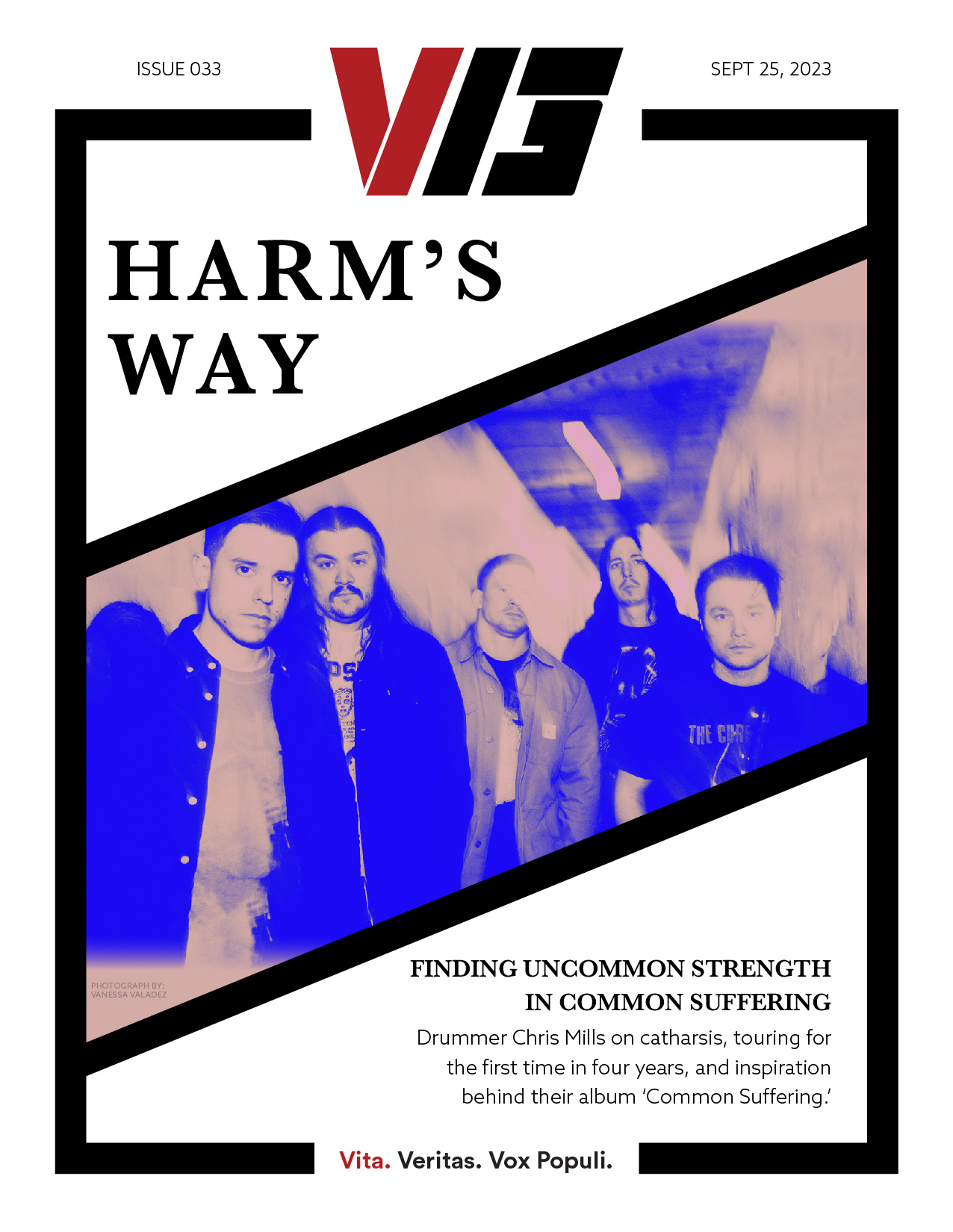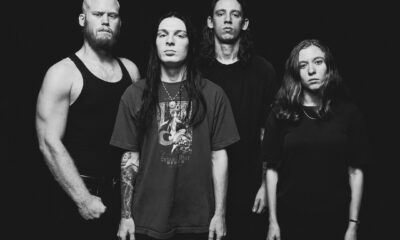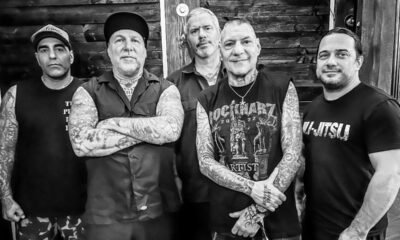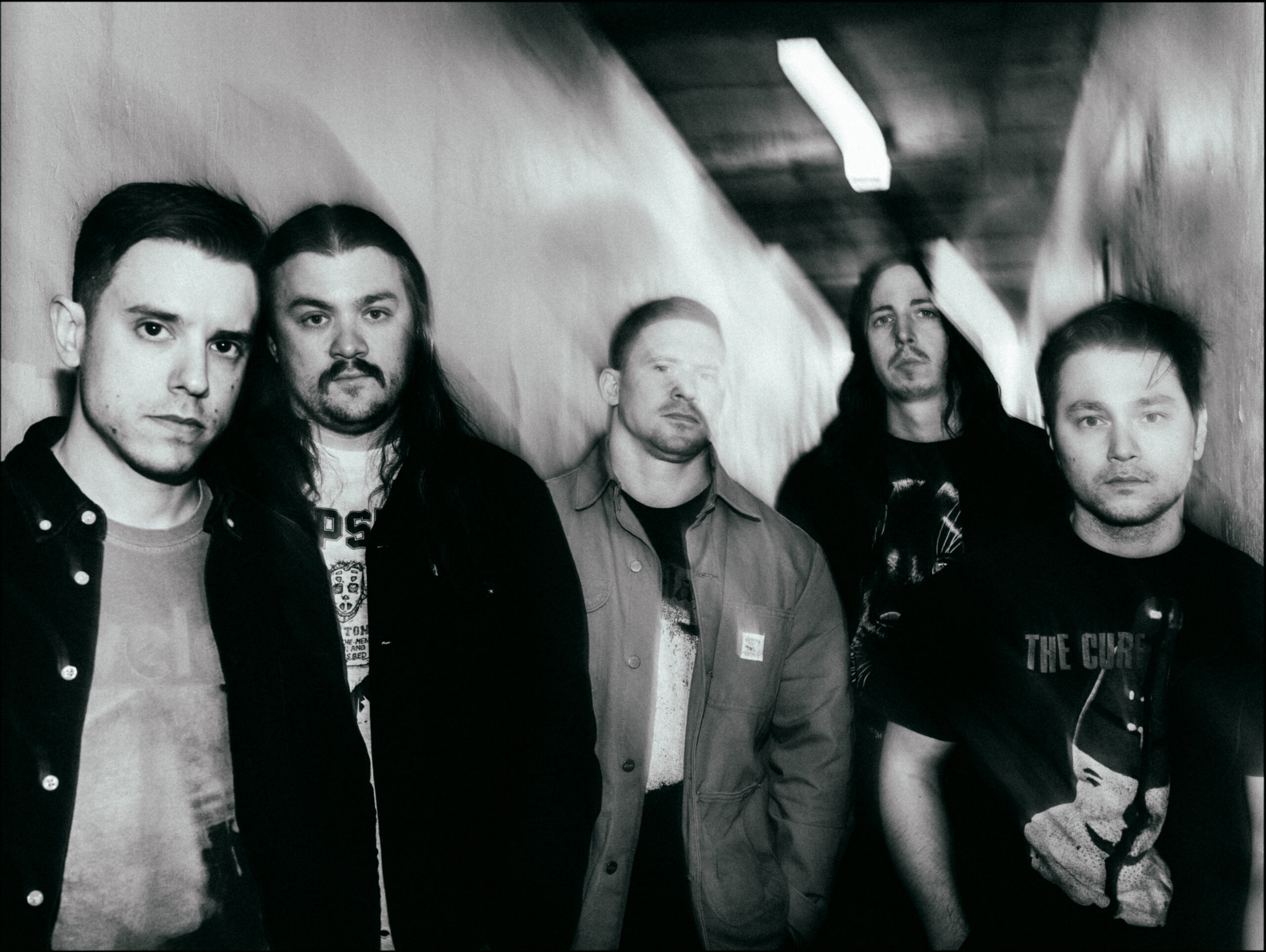

Hardcore/Punk
Harm’s Way: “There’s always a way out, right? And sometimes the best medicine for that is writing about it or talking about it.”
In our latest Cover Story, Harm’s Way drummer and licensed therapist Chris Mills speaks about catharsis, touring for the first time in four years, and inspiration behind their album ‘Common Suffering.’
As the first haunting chord of the new Harm’s Way album, Common Suffering, reverberates, one thing is clear: this is not a band content with a status quo. But then again, the Chicago-based outfit has never been one to languish or rest on laurels. With visceral sonic landscapes that claw their way into your soul, the group has not only elevated the genre but has managed to capture a collective disquiet—a mirror reflecting our own internal and societal turmoil.
The record is a departure from their earlier work, notably Posthuman, which was awash in minimalistic trappings. Common Suffering is neither minimal nor maximal—it’s elemental. Its tectonic riffs and deafening silences are the band’s primal scream against a world teetering on the brink of despair.
Chris Mills, the drummer, is also a licensed therapist, which may not be immediately apparent as you listen to the skull-crushing intensity of their music. Yet the album is undeniably therapeutic—a purgation of toxic relationships and existential dread. This therapeutic angle comes to life in our intimate conversation with Mills, where he delves into the psychology of relationships, the therapeutic values of heavy music, and the communal resonance that allows fans to find solace in such an abrasive form of expression.
Perhaps what makes Common Suffering so affecting is the synchronicity of its artwork with its music. The woodcut-style cover art, a striking piece by Canadian artist Corran Brownlee, amplifies the album’s thematic arcs. Brownlee’s artwork invokes a visceral reaction, echoing the themes and tones suffused throughout the record. Mills reveals that the artwork was not crafted specifically for them, but its rawness, panic, and distress were perfectly aligned with the music’s ethos. It’s not just a collaboration; it’s a cosmic alignment of artistic vision.
And it’s not just the band members who feel this alignment. Fans see themselves in the gut-wrenching lyrics and deafening instrumentals, in the stark artwork and in the eyes of other lost souls in the mosh pit. With songs like “Devour,” a brutally honest look into toxic relationships, the band provides a roadmap for navigating the labyrinthine complexities of modern life. Chris opens up about the personal experiences that inspired the song, emphasizing that sometimes the best medicine for a toxic situation is writing about it or talking about it. For many, it’s the cathartic release that serves as a lifejacket in the choppy waters of life.
Mills offers a perspective for those on the outskirts of the hardcore, punk, and metal scenes: they offer an outlet for the negative emotions we all struggle with. They create a space for coping, a sanctuary for those who feel alienated or unseen by larger society; ecstasy in the maelstrom, bliss in the macabre.
As you dive deeper into our conversation with Chris Mills, you’ll find yourself wrestling not just with the music but with the existential questions the album provokes. Questions that don’t offer easy answers but lead us down a path of self-discovery. This is what makes Common Suffering more than just an album—it’s an experience, a shared catharsis for all of us caught in the spiralling whirlpool of existence. And if that’s not groundbreaking, what is?
Read on for the full transcript of the interview, where Chris Mills navigates us through the intricacies of personal and collective suffering, the curative potential of heavy music, and the making of an album that is anything but common.
You can watch (on YouTube) and/or listen (on SoundCloud) to the full interview as you read our full write-up below.
Harm’s Way is an American hardcore band that has gained recognition over nearly two decades for its contributions to heavy music. Originating as an underground favourite, the band has evolved into a notable force within the hardcore punk and metal genres. Known for their continuous reinvention and absorption of diverse musical influences, they’ve crafted songs that have shaped the trajectory of heavy music.
Their latest album, Common Suffering, slated for a September 29th release via Metal Blade, represents a significant milestone featuring an ambitious sound in collaboration with prominent producer Will Yip at Studio 4 in Pennsylvania. The album explores themes such as chaos, misanthropy, and many others. With the release of this album, Harm’s Way continues to challenge the conventions of hardcore music, pushing into uncharted territories and exemplifying a commitment to creative growth and innovation. With me today is Chris Mills. Thank you for speaking with me today, Chris.
Chris Mills: “Thanks, man. Thanks for having me.”
Appreciate it. So, right off the bat, you guys have changed so much since the beginning. What sparked this transformation, this shift in common suffering? How’s working with Nick Godier been for you?
“Yeah, I mean, Nick is an incredible human being, incredible songwriter. You know, Nick and I kind of go back you know, to like the early 2010s, I would say.
“I knew Nick before that, but I moved to Milwaukee for a little bit doing some grad school stuff. Nick and I ended up getting together doing a band called Iron Cages. It was just kind of like a crust punk band. And it was like, from then on, I was just like, ‘Holy shit, I love writing music and working with this guy.’ A year or so after Rust came out and we were looking for someone to tour with us on guitar. And it was kind of like a no-brainer for me, Nick was the first name that popped to mind.
“I kind of like pitched him to the band and ended up linking up with us and it worked quite well, just personality-wise: great fit; obviously, creatively: amazing fit. And slowly he went from touring member to someone who took a pivotal role in our band.
“And we saw that with Posthuman, he was a huge contributor on that record and between Posthuman to Common Suffering took a pretty heavy hand in the songwriting process and really helped us continue to fully realize our sound and take it to places that we always wanted it to go, but didn’t necessarily have kind of the… collaborative kind of partners to really make that happen.
“And Nick really helped take it to that place, especially with Common Suffering. It was awesome working with Nick. And Casey too, he’s our bass player and does a lot of like our programming and samples and stuff like that.
“But the two of them just took the ball and ran with it with Common Suffering and really helped bring a lot of really cool and fresh ideas to the table. Really made for a really cool songwriting and creative process that spanned across a lot of time from the early parts of the pandemic over Zoom to finally getting able to be together and write together again towards the mid to latter parts of it, and then continuing on to the pre-production phase with William [Yip] at Studio 4. So yeah, overall it’s been awesome.
“Philosophically as a band, we’ve never wanted to stay stagnant. We never want to write the same record over and over and over again. If that was the case, we probably would have broken up a long time ago, but Harm’s Way is a huge creative outlet for us, and a big vehicle for us in terms of self exploration and connection with each other and our fan base and the DIY community as a whole.
“So, we never wanted to stay stagnant. We always wanted to grow. And it’s kind of just been our approach, always, since like day one of doing the band. And the minute that ends, we probably end, but you know, we feel like we’re in a really healthy place and in a good spot with that.”
You mentioned that it’s a large creative output for yourselves. “Cyanide” dives deep into media madness; how would you say music’s been helping you navigate this mess and what’s the big takeaway you ideally want fans to take away from that?
“‘Cyanide’ kind of looks at the current cultural climate and how media plays a big role in shaping that climate, and kind of living in this age of disinformation and feeling more polarized than ever as a society. I think music can kind of live and- I take that back, there’s like the Kid Rock‘s of the world that suck, but like, music that is kind of of independent to some of that noise, right? In its truest and purest form, and can be something that is way more objective.
“In terms of self expression and, you know, even analyzing themes like we analyzed in “Cyanide” and just saying, ‘Hey, this is what’s fucking happening. And this is the impact it’s having on you and us and communities around the world. What are we really going to do about that?’
“You know, it can feel so obviously debilitating and so demoralizing at times, but I think like, especially in spaces like punk and hardcore, metal and other, more DIY spaces, I think we can take a more objective view at that and be far more analytical in terms of recognizing the impact that it has on us and the community at large.
“And I think ‘Cyanide’ is really trying trying to do that. Obviously in some bleak ways, but also in some ways of trying to challenge listeners to take a closer look at what they are consuming and how it’s affecting them as a whole.”
It’s an interesting theme because I think one of the biggest things that faces people in punk and hardcore underneath that lid, there’s this meeting up of misanthropy, nihilism, cynicism. Is it more potent or most potent in that scene? What is the result on the people that are in that scene?
“I think punk and hardcore are spaces where people hopefully feel safe and vulnerable enough to take those emotions and take those feelings and voice them, and maybe even find community around them, right?
“Like, it’s a subculture for a reason right, because look, like if- you know, I might not be able to say the things that I want to say and feel in mainstream society or even in my family or at my job or whatever, right? And I think punk and hardcore – and obviously this is idealistic, but – they can provide a space where you can take some of this misanthropy, you can take some of this nihilism, you could take your existential crises and put that out there for others to see.
“And look, there might be a lot of people that feel the same way as you, and there can be this shared experience, right? And in that, I think there is some kind of beauty, right? Because in a lot of ways – and I guess if I’m speaking from my own experience – those communities gave me a place to call home and find commonalities and in a lot of ways, start to reframe my view on the world and actually undo some of these misanthropic feelings or the sense of fatalism or like this existential crisis I found myself in as a late teen. Because society as a whole – or at least mainstream societies – I felt pretty ostracized, and I guess estranged from, so I think those themes are quite common.
“Because obviously the groundwork has been laid from like the founding folks who started this whole thing, right? And then it’s just been obviously like saying, ‘Hey, it’s okay to bring that stuff here and to explore that stuff here and the process that stuff here.’
“And like I said, from my own experience, I was able to find a lot of peace and community through that and actually a lot more hope than I ever thought.”
You’re gonna be embarking on a tour again, and that must be beyond exciting because now that things are properly opening up, you guys get to branch out and explode from the stasis that we’ve all been in.
Are there any particular people, places, communities you’re looking forward to visiting? Obviously ‘all of them’ is a totally acceptable answer, but are there any ones that you wanted to specifically shout out or mention?
“Yeah. I mean, look, this is our first tour in like four years, which is crazy to think about, right? And in a lot of ways, we’re just super grateful and excited just to have the opportunity after all the time that has passed to be able to share this record that we feel really happy with and proud of with the rest of the world, you know, and particularly North America here, we’ve done a handful of shows over the last… I should say over the course of the pandemic: we did the Chicago record release for the Isolation re-release; we did For The Children in LA; we did a fest in Orlando; but it’s been really scarce.
“But I think I’m just really excited to get back to Middle America again. That might sound crazy for some of my bandmates to hear, ’cause we’ve had, and this is no dig at Middle America, we’ve been a band for a long time and we’ve definitely played some shot shows in Middle America. But also as we’ve grown, we’ve had some of the most amazing shows we’ve played there, just because of the [level of] appreciation. Thinking like, ‘Shit, what am I gonna be in Kansas City again playing a show?’ like I can’t imagine being in Salt Lake City again playing a show, you know. But we get those opportunities.
“And that’s really cool and we’re really excited for that. Super stoked to get back to Toronto, get back to Canada and play some shows because that’s always been almost like a second or third hometown for us. We’ve always done really well there and always felt really appreciated and loved, so really excited to be able to go north of the border again, play some shows- again, during the pandemic, it’s like, are we ever going to be able to play Canada again? Like, you know, I’m going to go overseas. So, as a whole, it’s like, I think we’re so excited to just be able to play again and travel. And I feel like we’re getting a second chance at this experience.
“Second chance at the ability to kind of share our work with others. Cause I’ll say, over the pandemic, there was so much uncertainty, even for us as a band, cause we were obviously like forced to make pretty tough decisions about work and profession and careers and stuff like that to obviously keep our heads above water, you know?
“And in some ways it felt like music and Harm’s Way was almost kind of becoming secondary, which was really weird because it was such an integral part of our lives for so long, but obviously over time and writing and creating this record, recording this record and kind of seeing it through, we felt like we had to, you know? And the opportunity to still be able to do it and that there’s still excitement across the country for people to see us just feels amazing.”
Matty Matheson rocked a Harm’s Way in the first episode of The Bear and immediately rocked a Power Trip one in episode two like
— justin (@justinhxc) June 24, 2022
I literally cannot count the amount of people that would be very excited as well for you to revisit north of the border as well. And I know there’s at least one other guy that would be. So I noticed a subtle shout out to you guys: I was watching The Bear, season one, Matty Matheson, his character’s wearing a Harm’s Way shirt, and I thought that was just… I don’t know, the coolest meeting of things that I appreciate and first of all, I wanted to ask, do you know Matty personally or have you ever met?
“Yeah, so I’ve never met Matty, but if we’re going back in time, we played Parts and Labour, we played his venue, we may have met then.
“At that time, he was always so gracious with bands coming through and cook for them, hang out with them, do all that. I don’t think I ever met Matty, but I think he does know our guitar player, Bo [Lueders]. Bo interviewed him with his co-host Colin [Young] (Twitching Tongues, God’s Hate) for a podcast they do called Hard Lore, so there’s always been like a relationship with Matty sometimes indirectly, but now more directly I would say but the whole thing with like the shirt, it kind of like came out of, came out of nowhere.
“I think, you know, obviously Matty is a fan of hardcore and punk and I think you know, from, from my understanding, you know, he was like, “Oh, I’m going to be in Chicago or I’m going to be on a show that, you know, is in Chicago, I need to wear a Harm’s Way shirt.” One of our good friends saw the tweet and just delivered the shirt to him.
“I was like, ‘Oh, here, you can have one of my old ones.’ And that’s what ended up making it on the show. It was so fucking cool. And it was funny because after season one began to air, I was just getting screenshots left and right, or like texts left and right.
“It’s all these people I know are just like, ‘Hey, is this your band?’ so it was like a crazy full circle moment. Like when I’m hearing from people from my school or like, you know family, friends about them seeing my band’s, shirt in a show, it was really cool, but obviously shout out to Matty for doing that. And it’s such a cool nod to us and obviously the city of Chicago.
I’m really heartened to hear that you guys have been just exploring what you needed to and, moving back to the album for a second here, I, I wanted to know what it was like basically I’m wondering how, I think, I feel as though the album really captures the last three years perfectly.
Do you agree, first of all, and can you put your finger on why that is?
“It’s interesting because that wasn’t necessarily- and, you know, James could probably speak a little bit more on this, but hey, he’s my best friend, I’ll speak for him. [laughs]
“The intention wasn’t to be like, ‘Okay, we’re going to make a record that encapsulates everything we’ve gone through individually, collectively, on a societal level.’ If anything, James typically writes from a very introspective, intrapersonal sort of level, you know?
“And, it was kind of like, upon seeing the lyrical themes, upon seeing the collection of songs, and listening to the record and the textures on it that it was almost like… In research, they talk about inductive stuff and deductive stuff or in terms of like theory or hypotheses, it was something that we deducted almost from the finished piece, right?
“And we’re like, ‘Holy shit, this gets at so, so much,’ you know? This gets at the individual experience over the last three years, this gets at the collective experience, like it kind of happened over the past few years, and again, it was something we were able to deduct thematically and be like, ‘Holy shit, it kind of came together on its own.’ It was just really interesting to come to that conclusion, or come to that point with the album, so yeah, I mean, I think it really does.
“And it was accidental in some ways, but overall, it really helped us come to that title, Common Suffering, right? Because, obviously, like, it’s James’ individual experiences and personal experiences across the lyrics, but it felt so universal in some ways, too, right?”
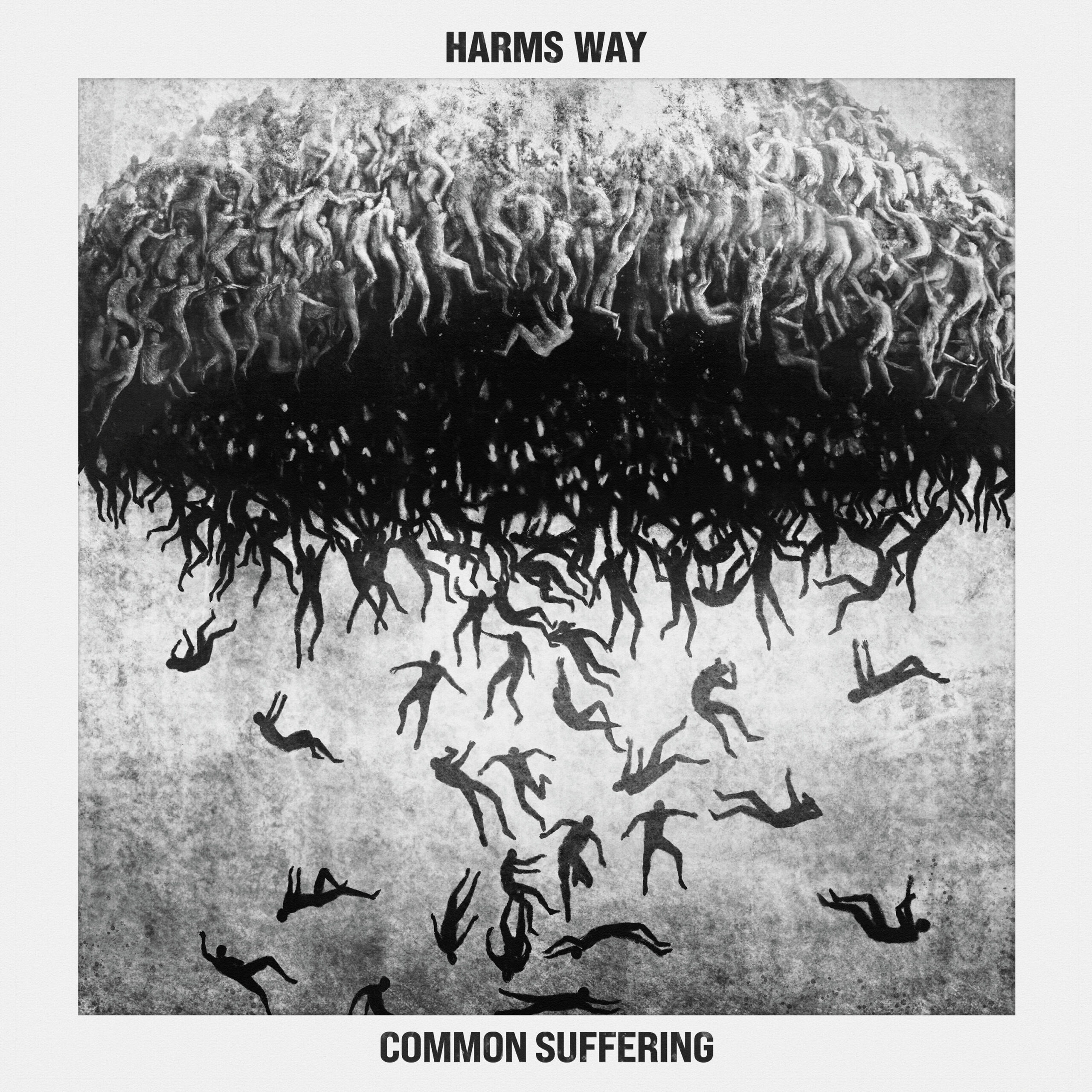
Common Suffering Cover Art by Corran Brownlee
I wanted to ask about the artwork because I feel like it’s so beautifully emblematic and representative of the music, but also where we’re all sort of at, where we’ve come from. That woodcut-style image, there’s lots to unpack there, but I’m wondering what your involvement was in the process of the development of that artwork, your feeling on it, and your reaction to it.
“So the cover art and back piece on Common Suffering actually were- they were pre-existing pieces by this artist Corran Brownlee, who is also a fellow Canadian, but yeah, amazing, amazing human being.
“It was work that I had come across and just felt like this visceral kind of reaction to when I first saw it… and yeah, I had this emotional reaction to it and it’s something I’d shared with our group and our team. And I was like, ‘Hey, I really, really like this, and I’m kind of having these feelings, and in some ways, I feel like it encapsulates and kind of captures a lot of the themes found on this record, you know?’ And we kind of sat with it for a while and thought about it, and I said, ‘Fuck it,’ one day. I was like, ‘I’m just gonna reach out to him and just say what’s up and just let him know how much I admire his work and how cool it would be to consider working together,’ like kind of shoot my shot, so to speak. [laughs]
“And Corran was so cool and so open and it just felt like there was this like, alignment, in terms of just vision and mutual respect – he was kind of like ‘Oh yeah, hey, heard your band too, you guys are fucking awesome, it’d be an honor to work together,’ and stuff and it it just felt great, you know. There’s like a kind of harmony between the two of us and for me personally I love working with people who are philosophically aligned with us, dynamically aligned with us. Like if i’m gonna bring you on or if you’re gonna bring us on, I want to be able to ride for each other and have this, this shared mutual respect, which is kind of how I try to operate at this point with my work.
“So yeah, sorry, I’m getting off track there, but, just the work as a whole, and his work as a whole, it felt so aligned with lyrical themes and the collective kind of nature of the work itself and it creating anxiety and panic and fear and distress, it felt like it just lined up so well. I would listen to our songs and look at the art, I would do that to just see how it felt, and again, I felt that alignment. I felt like it just worked so well.
“And now I look at those pieces and I hear our songs, right? I look at those pieces and it just lines up in such a beautiful, beautiful way. And I think that just kind of speaks volumes to the synchronicity between our work and his work, so to speak.
“So yeah, we’re really excited about it, it’s a bit of a departure from, from like Posthuman, which was kind of minimalistic and clean, but Posthuman was the way it was for a reason. And Common Suffering is the way it is for a reason. And Corran was just such an amazing partner in helping bring our vision- I shouldn’t say bring our vision to light, but aligning with our vision for us to create this shared piece.”
So “Devour,” hits on toxic relationships. How much of that is from personal experience and what do you want to say to others that are stuck in those situations?
“You know, knowing James and kind of knowing more of the context behind that song, I would say it’s- and he’d be okay with me sharing this, but- it’s definitely from personal experiences, or a personal experience for him.
“And I would say in a lot of ways personal experiences for all of us, right? I think many of us have probably found ourselves in places where we were in these relationships that were really tough to navigate and kind of soul-sucking in a sense and disproportionately weighted in one direction or the other, you know?
“And I actually like this question because, look, I’m a therapist. I have opinions on relationships, I guess. And I guess what I would want to share is, is that there’s always a way out, right? And sometimes the best medicine for that is writing about it or talking about it.
“I mean, ‘Devour’ was written as a means for probably like processing for James, and catharsis, right, to work through that experience for him. And look, boundaries are awesome. Boundaries exist for a reason in relationships. And sometimes you got to learn the hard way, how to set those and how to define those for yourself, you know.
“But yeah, I love that song, obviously on a music level, but on a lyrical level, just because I think it is obviously so relatable to so many people.
I actually wanted to unpack just a little bit: it’s the same tired observation that people always offer us, people that are outsiders from hardcore and punk and metal and any other heavy genre and others that are sort of adjacent, What would you say, wearing your therapist’s hat, or not, whichever you prefer, I’d be really curious to see your take on that where people can gain that benefit.
“I guess what I hear you asking me is how might outsiders – “outsiders,” I’ll put that in quotes – kind of view this subculture, view metal, hardcore, heavy music in general, and what, what I want to say to those people in terms of like, what, what do people get from this, you know?
“Yeah, I mean, I think this kind of goes back to one of the earlier questions you asked me, when we were kind of exploring concepts of misanthropy and nihilism and kind of all this, all this darkness, so to speak, quote unquote.
“I would say, look, this music, these scenes, are an outlet for that, right?
“Because we all have negative emotion. We all struggle, right? And we got to find somewhere to process that and put that and cope with that, right? And I think this music, our music, these scenes create a space for that to happen in a healthy and productive way. Hopefully. Obviously that’s idealistic, right? But the hope is that it creates an outlet for people to to explore and process that stuff and hopefully let it go, too. And in addition to that, it’s community, right? It’s relationships. It’s feeling seen, right?
“It’s like all these things that maybe many struggle to find in larger society.
Thank you so much for speaking with me. And it’s been such a pleasure and just getting to understand a little bit more about the process behind the album and hearing that you will in fact be coming up to Toronto is very exciting not just for me, but for many people I know again, thank you so much for taking the time with us and yeah all the best and you can get Common Suffering when it comes out on September 29th via Metal Blade.
“Absolutely. Yeah. Thank you, man. Appreciate the time and space to kind of talk today and hope to provide more context and there’s, you know, our thinking and and just the album as a whole.”
-

 Alternative/Rock5 days ago
Alternative/Rock5 days agoThe Warning Shake the Foundations of a Sold-Out Leeds Stylus [Photos]
-

 Music2 weeks ago
Music2 weeks agoTake That (w/ Olly Murs) Kick Off Four-Night Leeds Stint with Hit-Laden Spectacular [Photos]
-

 Alternative/Rock5 days ago
Alternative/Rock5 days agoThe V13 Fix #011 w/ Microwave, Full Of Hell, Cold Years and more
-

 Alternative/Rock2 weeks ago
Alternative/Rock2 weeks agoThe V13 Fix #010 w/ High on Fire, NOFX, My Dying Bride and more
-

 Features2 weeks ago
Features2 weeks agoTour Diary: Gen & The Degenerates Party Their Way Across America
-

 Indie5 days ago
Indie5 days agoDeadset Premiere Music Video for Addiction-Inspired “Heavy Eyes” Single
-

 Folk6 days ago
Folk6 days agoKatherine Perkins Strikes the Right Tone with Her “Hold On” Music Video Premiere
-

 Country1 week ago
Country1 week agoBrooke Ashton Chats About Her “Someone” Single, Creative Process, and More!

